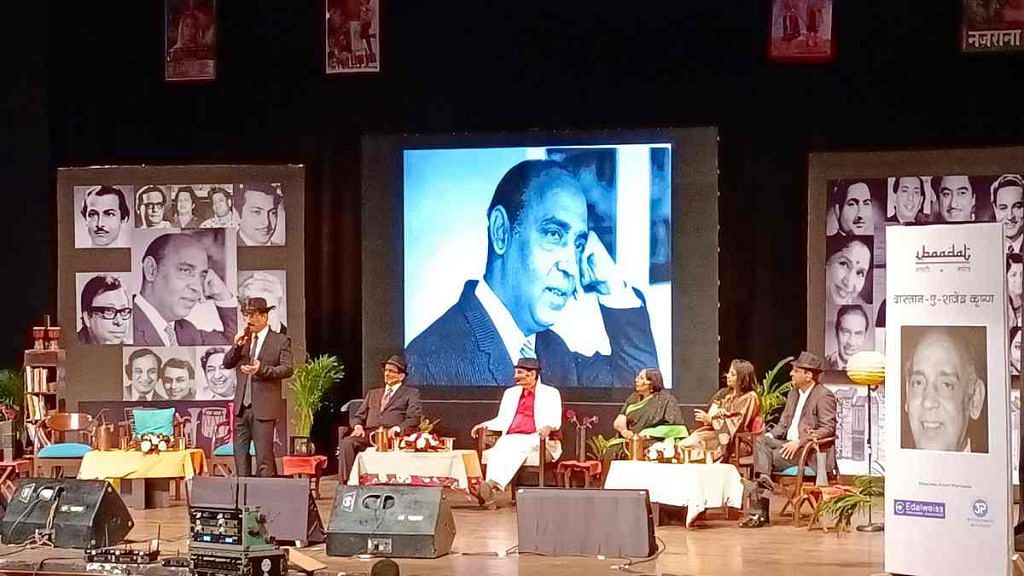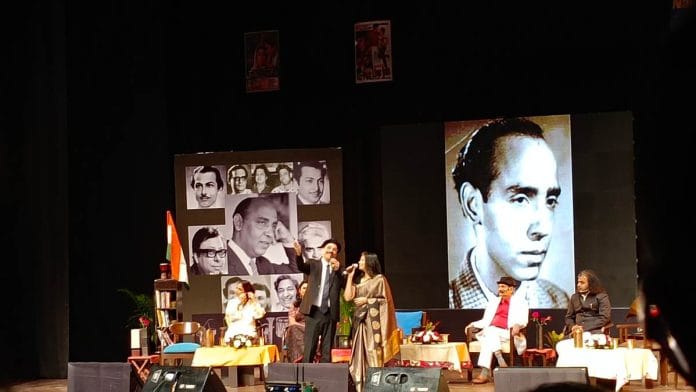New Delhi: No matter our mood—sad, happy, waiting for someone, watching the rain, or even admiring the moon—there’s a song for every situation. Yet, while we easily recall singers, actors, and the films these songs appear in, few of us remember the lyricist who penned the words.
One such lyricist is Bollywood’s Rajinder Krishan. He wrote the words for numerous hit songs, such as ‘Itna na mujhse tu pyar badha’ (Chhaya, 1961), ‘Jaag dard-e-ishq jaag’ (Anarkali, 1953), ‘Ek chatur naar karke sringar’ (Padosan, 1968), and ‘Pal pal dil ke paas’ (Blackmail, 1973). But he got the limelight only after winning a jackpot at the Mahalaxmi Race Course in 1973 and suddenly became the richest lyricist overnight.
“Rajinder Saheb was fond of many things, like cigarettes, alcohol, food, and drinks. One such hobby made him a millionaire and the richest lyricist in the 1970s,” said noted poet Obaid Azam Azmi at a sold-out event celebrating the life, poetry, and songs of Rajinder Krishan at Delhi’s Kamani auditorium earlier this month. “He won approximately Rs 48 lakh in horse racing!”
While most music events revolve around famous singers, composers, or actors, the Delhi-based Ibaadat Foundation focuses on lyricists, often ignored or only remembered belatedly. Their offering, Daastaan-e-Rajinder Krishan, was a musical show paying tribute to the lyricist and screenwriter’s personal and professional journey. Over the course of two-and-a-half hours, the show blended storytelling, conversation, theatre, and song to make Krishan come alive to the audience.
The stage was set up like a drawing room, where more than six artists, anchors, and singers—including Supriya Joshii, Anand Bahal, and Sangeeta Melekar— gave an impression of casually conversing about the lyricist’s life and career, occasionally breaking into impromptu songs. The conversation started with Krishan’s Filmfare Award for best lyricist in 1965 for the movie Khandan, with singer Supriya Joshii launching into its famous track, ‘Tumhi mere mandir, tumhi meri pooja’.
Krishan wrote lyrics that depicted almost every situation and emotion. One such song is a favourite in school functions even today—‘Tumhi ho mata pita tumhi ho’ from the 1962 film Main Chup Rahungi. Two child artists, Parth and Dev, appeared on stage to perform this beloved song.
Also Read: ‘No script more scientific than Devanagari’—Javed Akhtar would write all Urdu poetry in it
Bringing alive a golden era
A song’s power can be gauged by the audience’s desire to sing along. This happened several times during Daastaan-e-Rajinder Krishan. Whenever a panellist broke into song, the entire packed auditorium erupted in a chorus. The audience couldn’t resist joining in as soon as iconic melodies such as ‘Kaise kisi ka sahara banoon’ or ‘Itna na mujhse tu pyar badha’ filled the air. Everyone seemed to know the words.
The specially arranged music tracks included many evergreen hits— from ‘Gore gore o banke chore’ (Samadhi, 1950), ‘Man dole mera tan dole’ (Nagin, 1954) and ‘Ye zindagi usi ki hai’ (Anarkali, 1953) to ‘Wo dil kahan se laun’ (Bharosa, 1963), ‘Bhooli hui yaadon mujhe’ (Sanjog, 1961), and ‘Mere saamne wali khidki mein’ (Padosan, 1968), among others. Altogether, it was like a trip back into Bollywood’s original golden era.
While Rajinder Krishan worked with several composers, some of his best work was with C Ramchandra and Madan Mohan. With Mohan, he worked on no fewer than 42 movies, with the duo creating many unforgettable songs together.

Adding depth and a personal touch to the show was the presence of Krishan’s son, Rajesh Duggal, and music director Madan Mohan’s daughter, Sangeeta Gupta.
Giving insight into his father’s passion for his craft, Duggal described how Krishan was more interested in writing poetry than studies even in childhood. And inspiration had a way of striking at inopportune moments. “Whenever he remembered some lines or got some inspiration, he used to write on whatever paper was available nearby—it could be a restaurant bill, paper napkin, newspaper margin, or even cigarette box’s paper,” added show anchor Nandita Kodesia. “However, he always lost these papers or left them somewhere and was never able to find them when he needed them.”
The Ibaadat Foundation has organised 56 shows across various cities in India and Dubai, covering poets and lyricists such as Majrooh Sultanpuri, Shakeel Badayuni, Shailendra, Neeraj, Hasrat Jaipuri, Sahir Ludhianvi, and Raja Mehdi Ali Khan.
‘Daastaan-e-Rajinder Krishan’ was initially held in Delhi in September, 2016. Due to popular demand, the show returned to Kamani auditorium on 8 and 9 March for two houseful shows.
A lyricist’s responsibility is two-fold, said Ibaadat Foundation chairman Prithvi Haldea—one is to “write a song that is based on the situation of the film”. The other is that “it should elevate the status of the film as well”. Krishan often managed to hit both targets.
Also Read: Jan Nisar Akhtar — Bollywood lyricist who was ‘poet in a real sense’
A bon vivant with depth
An audio clip from an old interview gave a glimpse of Rajinder Krishan’s fun-loving personality. He described entering the horse stable before a race and asking the horses, “Who’s going to win?” Whichever horse moved its head, that’s the one he’d bet on. This strategy, according to him, even landed him his jackpot win. Hearing this, the audience burst into laughter.
Apart from horse-racing, Krishan had another hobby—enjoying good food. His passion for the perfect meal apparently led him to once take a spontaneous flight from Mumbai to Delhi just to eat chhole-bhature.
When it came to poetry and lyrics, Krishan was eclectic, drawing inspiration from the mundane to the profound.
“He got the inspiration for one of his most fun-loving songs, ‘Eena meena deeka,’ from his daughter’s nursery rhyme, ‘Eeny, meeny, miny, moe’,” said Haldea.
After Mahatma Gandhi’s assassination, Krishan penned a song titled ‘Suno suno aye duniyawalon, Bapu ki yeh Amar Kahani’ (Listen, O people of the world, this immortal story of Bapu). Sung by Mohammed Rafi and composed by Husnlal Bhagatram, this song ended Krishan’s days of struggle. Though not part of a film, the lyrics and music resonated widely. “Because of this song, dad’s magic suddenly spread all over India,” said Duggal.
Daastaan-e-Rajinder Krishan was a multifaceted show, encompassing music, laughter, emotions, jokes, and poetry. It ended with the whole auditorium singing the national anthem.
(Edited by Asavari Singh)






